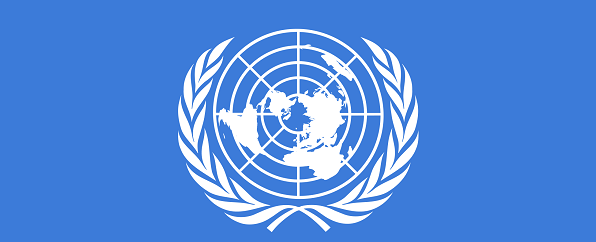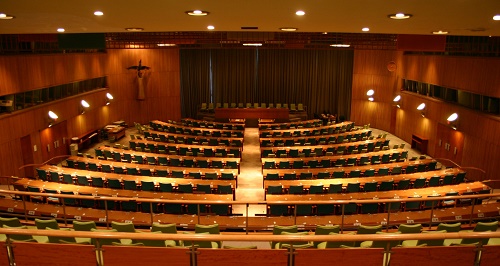
United Nations
United Nations is an international organisation whose stated aims are facilitating cooperation in international law, international security, economic development, social progress, human rights and achievement of world peace.
UN was founded in 1945, as a successor to the League of Nations which was widely considered to be ineffective in its role, as it had been unable to prevent World War II.
The UN has six official languages: Arabic, Chinese, English, French, Russian and Spanish. The UN is financed from assessed and voluntarily contributions from member states.
The United Nations day is celebrated on 24 October each year. Presently there are 193 member states of the United Nations. There are six principle organs of the United Nations they are:
- General Assembly.
- The Security Council.
- The Economic and Social Council.
- The Trusteeship Council
- The International Court of Justice
- The Secretariat
General Assembly
General Assembly is also called as the town meeting of the world. The General Assembly meets at least once in a year, and the session commences on the first Tuesday of September. It appoints the Secretary General of UN Secretariat on the recommendation of the Security Council.
The presidency of Assembly rotates each year among the five geographical groups of the countries. These are Asia, African, Latin America, East European and West European and other States. Consist of all Member States of UN.
Its first session was convened on January 10, 1946 in the Westminster Central Hall in London and included representatives of 51 nations.
Each member nation can send five delegates but each nation has only one vote. The headquarters of General Assembly is at New York.
Security Council
The main aim of Security Council is the maintenance of international peace and security. The Security Council originally consisted of eleven members but increases to fifteen in 1965.
Security Council Comprises of Five permanent Members namely China, United Kingdom, Russia, France and USA and 10 non-permanent members, elected for a term of 2 years by a two-third majority of the General Assembly, five non-permanent members retire every Year. Retiring members cannot be re-elected immediately.
Security Council has power has the power to make decisions that member governments must carry out under the United Nations Charter. The decisions of the council are known as United Nations Security Council Resolutions.
Permanent member have veto power which can be cast against any decision supported by the majority members. The Head Quarters of Security Council is at New York.

Economic and Social Council (ECOSOC)
Economic and Social Council main aim is to promote social progress and better standards of Life. Economic and Social Council comprises of 54 members, 18 of whom are elected every year by the General Assembly of UN, to serve a three year term.
The retiring members as well as the President are eligible for immediate re-elections. The Headquarter of Economic and Social Council is at New York.

The Trusteeship Council
The United Nations Trusteeship council was established to help ensure that trust territories were administered in the best interests of their inhabitants and of international peace and security.
Trusteeship council was formed in 1945. The Headquarter of Trusteeship Council is at New York.

The International Court of Justice
The International Court of Justice is the primary judicial organ of the United Nations. Its main functions are to settle legal disputes submitted to it by states and to provide advisory opinions on legal questions submitted to it by only authorized international organs, agencies and the UN general Assembly.
The International Court of Justice consists of 15 Judges. The Judges are of the court are elected by the General Assembly along with the Security Council for a nine year term. The International Court of Justice was established in 1945. The Headquarter of International Court of Justice is at Hague, Netherland.

The Secretariat
The United Nations secretariat is one of the principle organs of the United Nations, an intergovernmental organisation charged with the promotion of aiding states to collectively maintain international peace and security. It serves as a forum for member-state to discuss and resolve pressing issues in the international field through primarily diplomatic resources.
The Secretariat is composed of a security General, assisted by a staff of international civil servants worldwide. The Secretary General is appointed by the General Assembly upon the recommendation of the Security Council.
The Secretary General of the UN is elected for five years and eligible for re-election.
| Year | Name | Nation |
| 1946 | Trygve Lie | Norway |
| 1953 | Dog Hammarskjold | Sweden |
| 1961 | U Thant | Burma |
| 1972 | Kurt Waldheim | Austria |
| 1982 | Javier Peres De Cuellar | Peru |
| 1992 | Dr Boutrous Boutrous Ghali | Egypt |
| 1997 | Kofi Anna | Ghana |
| 2007 | Ban-ki-Moon | South Korea |
Specialized Organizations
There are many UN organizations and agencies that function to work on particular issues.
- International Atomic Energy Agency (IAEA)
- International Fund for Agricultural Development (IFAD)
- International Maritime Organization (IMO)
- United Nations Educational, Scientific and Cultural Organization (UNESCO)
- World Health Organization (WHO)
- United Nations Children’s Emergency Fund (UNICEF)
- International Civil Aviation Organization (ICAO)
- United Nations Industrial Development Organization (UNINDO)
- International Labour Organization (ILO)
- United Nations Development Fund for Women (UNIFEM)

